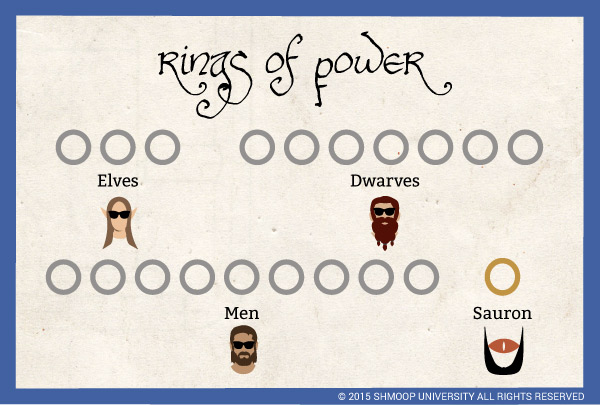Character Analysis
Note: Before we jump into discussing Sauron in The Two Towers, you might want to take a peek at Sauron's "Character Analyses" for The Hobbit and The Fellowship of the Ring for some background.
We get 99.999% of The Two Towers through the eyes of the Good Guys, who are busy Overcoming Obstacles and Fighting Against Evil. This is not Silence of the Lambs or even Harry Potter, where we get at least some insight into what makes the bad guys into raging villains. Sauron is Evil because he is Evil, and that's pretty much all there is to it. Our Good Guys need an enemy to fight, and Sauron fits the bill.
In other words, this guy "Sauron" is not a realistic or three-dimensional character. He's just a collection of traits that Tolkien wants us to associate with the whole idea of Evil. And what are those traits?
Evil Villain Sign #1: First of all, he's got a lust for power and a desire to dominate the world. That's your first clue that Sauron is a Bad Guy: he wants to conquer Middle-earth. Not a good sign, right there.

(Click the infographic to download.)
Evil Villain Sign #2: Sauron is really suspicious. He doesn't trust anyone—and why should he, when he is completely untrustworthy himself? We find out that he's suspicious because the Mordor orcs say so. They tell the Isengard orcs that Sauron knows that Saruman is up to no good. Of course, it turns out that this is true, and that Saruman can't be trusted. But the fact that Sauron assumes Saruman is going to double-cross him when he has no proof also says something about Sauron's own betraying nature.
Evil Villain Sign #3: Sauron is an arrogant jerk, all too certain of his own victory. Overconfidence is one of the classic traits of the evil villain. You know the old cliché of the Bad Guy who laughs madly because he's so sure he's going to beat Our Heroes (right up until the minute that Our Heroes bring the Bad Guy down)? Sauron practically invented that trick.
We see this arrogant side of Sauron's character when Pippin looks into the Orthanc palantír and catches the burning eye of Sauron himself. Instead of actually asking Pippin who he is or where he's from (which would have been a disaster for our side, since Pippin would have spilled all the beans), Sauron makes a bunch of assumptions. He assumes (a) that Pippin is a captive of Saruman's; (b) that Pippin must be that Ring-bearer hobbit Sauron has heard so much about; (c) that Saruman is making Pippin look into the palantír to torture him; and (d) that Sauron's biggest worry is that Saruman might take the Ring for himself.
Wrong.
Of course, we know (a) that Saruman's the prisoner, locked up in Orthanc, not Pippin; (b) that Pippin is definitely not Frodo, especially since Frodo is already in Mordor; (c) that Pippin is just looking into the palantír because he's kind of, well, dumb; and (d) that Sauron's biggest problem is that the Good Guys are trying to destroy his Ring, not use it. But such a concept is unfathomable to our resident Big Bad. If Sauron had stopped for one second to think that maybe he doesn't know absolutely everything, he might have been able to find out about Frodo's quest, and then all of Middle-earth would be totally doomed.
Instead, Sauron decides to enjoy himself torturing Pippin for a while (which is horrible in its own right). So, in a weird kind of way, (spoiler alert!) Sauron's inevitable failure at the end of the three books is his own fault: he's the one who let himself get lazy out of a sense of arrogance and overconfidence. And that self-centered ego is what makes him a villain and, eventually, a failure. Lesson of the day? Crime doesn't pay.